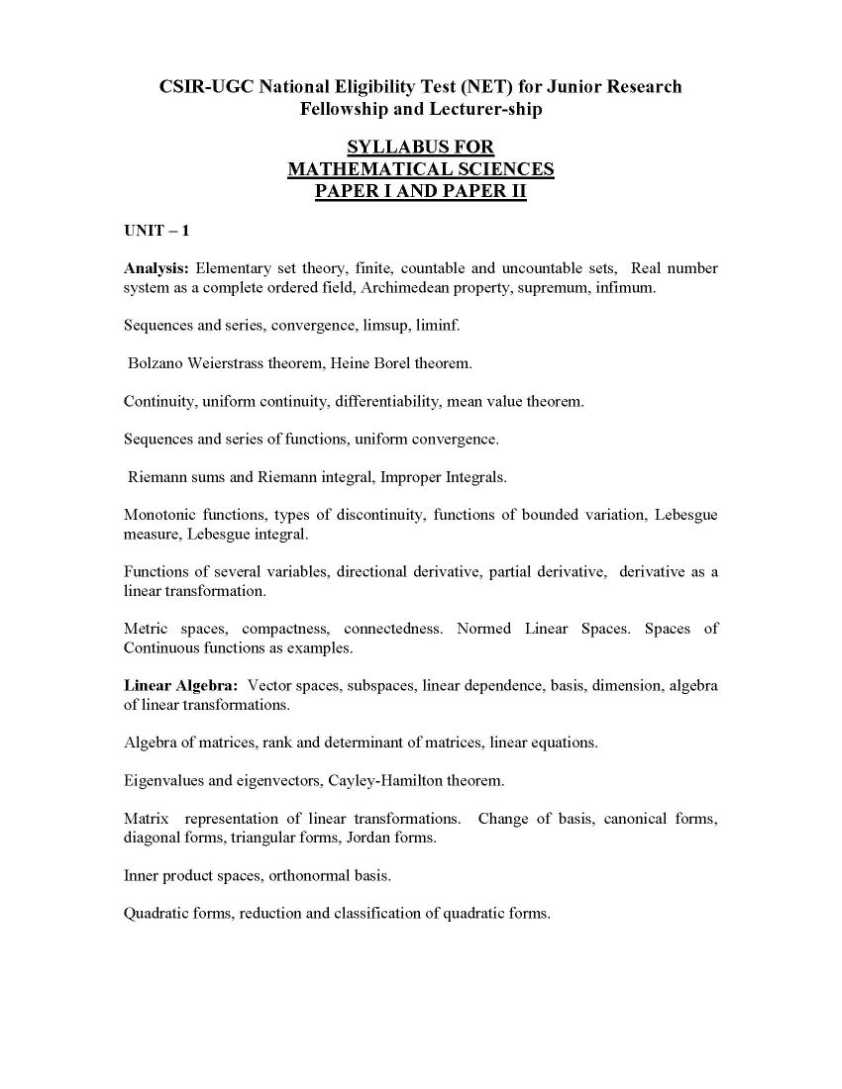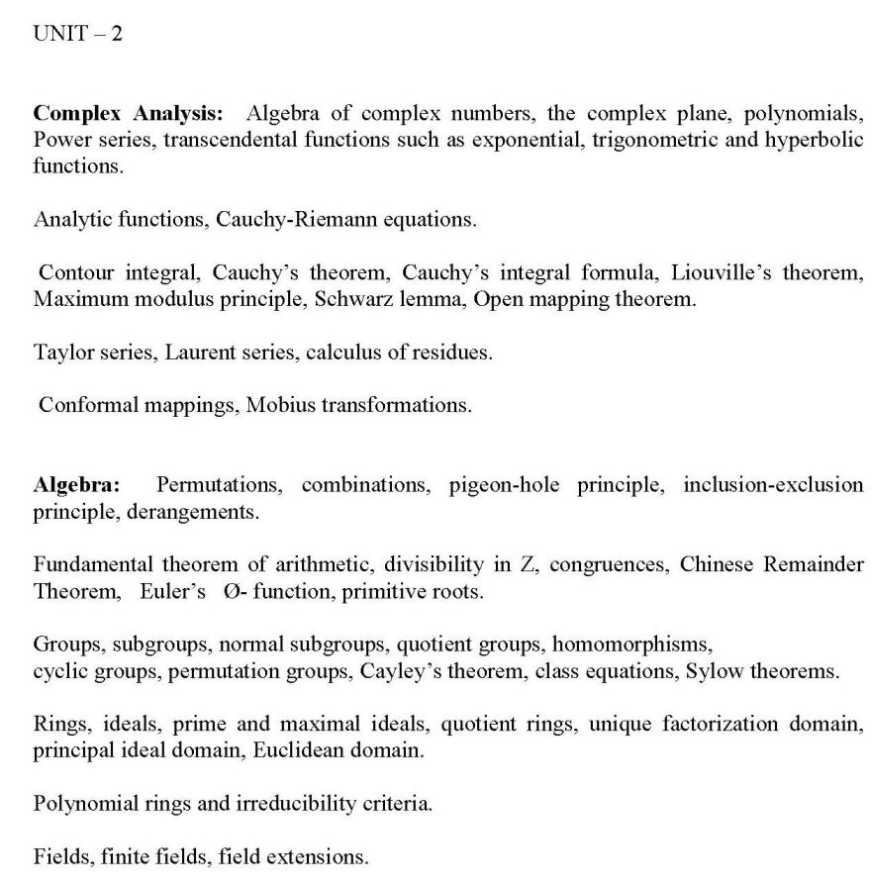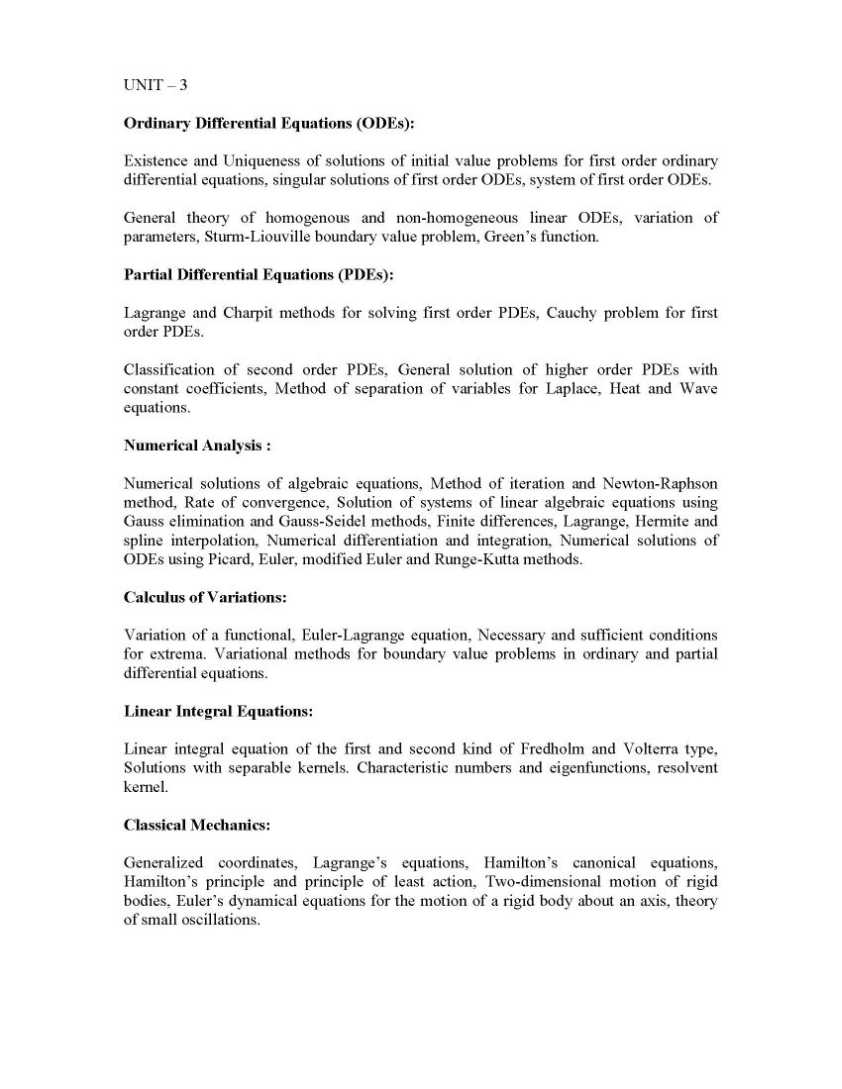| Re: Syllabus of UGC NET CSIR of Mathematical Sciences
As you are asking for Syllabus of UGC NET CSIR of Mathematical Sciences paper so on your demand i am providing same here:
UGC NET CSIR of Mathematical Sciences paper syllabus
UNIT 1
Analysis: Elementary set theory, finite, countable and uncountable sets, Real number
system as a complete ordered field, Archimedean property, supremum, infimum.
Sequences and series, convergence, limsup, liminf.
Bolzano Weierstrass theorem, Heine Borel theorem.
Continuity, uniform continuity, differentiability, mean value theorem.
Sequences and series of functions, uniform convergence.
Riemann sums and Riemann integral, Improper Integrals.
Monotonic functions, types of discontinuity, functions of bounded variation, Lebesgue
measure, Lebesgue integral.
Functions of several variables, directional derivative, partial derivative, derivative as a
linear transformation.
Metric spaces, compactness, connectedness. Normed Linear Spaces. Spaces of
Continuous functions as examples.
Linear Algebra: Vector spaces, subspaces, linear dependence, basis, dimension, algebra
of linear transformations.
Algebra of matrices, rank and determinant of matrices, linear equations.
Eigenvalues and eigenvectors, Cayley-Hamilton theorem.
Matrix representation of linear transformations. Change of basis, canonical forms,
diagonal forms, triangular forms, Jordan forms.
Inner product spaces, orthonormal basis.
Quadratic forms, reduction and classification of quadratic forms.
UNIT 2
Complex Analysis: Algebra of complex numbers, the complex plane, polynomials,
Power series, transcendental functions such as exponential, trigonometric and hyperbolic
functions.
Analytic functions, Cauchy-Riemann equations.
Contour integral, Cauchys theorem, Cauchys integral formula, Liouvilles theorem,
Maximum modulus principle, Schwarz lemma, Open mapping theorem.
Taylor series, Laurent series, calculus of residues.
Conformal mappings, Mobius transformations.
Algebra: Permutations, combinations, pigeon-hole principle, inclusion-exclusion
principle, derangements.
Fundamental theorem of arithmetic, divisibility in Z, congruences, Chinese Remainder
Theorem, Eulers - function, primitive roots.
Groups, subgroups, normal subgroups, quotient groups, homomorphisms,
cyclic groups, permutation groups, Cayleys theorem, class equations, Sylow theorems.
Rings, ideals, prime and maximal ideals, quotient rings, unique factorization domain,
principal ideal domain, Euclidean domain.
Polynomial rings and irreducibility criteria.
Fields, finite fields, field extensions.
UNIT 3
Ordinary Differential Equations (ODEs):
Existence and Uniqueness of solutions of initial value problems for first order ordinary
differential equations, singular solutions of first order ODEs, system of first order ODEs.
General theory of homogenous and non-homogeneous linear ODEs, variation of
parameters, Sturm-Liouville boundary value problem, Greens function.
Partial Differential Equations (PDEs):
Lagrange and Charpit methods for solving first order PDEs, Cauchy problem for first
order PDEs.
Classification of second order PDEs, General solution of higher order PDEs with
constant coefficients, Method of separation of variables for Laplace, Heat and Wave
equations.
Numerical Analysis :
Numerical solutions of algebraic equations, Method of iteration and Newton-Raphson
method, Rate of convergence, Solution of systems of linear algebraic equations using
Gauss elimination and Gauss-Seidel methods, Finite differences, Lagrange, Hermite and
spline interpolation, Numerical differentiation and integration, Numerical solutions of
ODEs using Picard, Euler, modified Euler and Runge-Kutta methods.
Calculus of Variations:
Variation of a functional, Euler-Lagrange equation, Necessary and sufficient conditions
for extrema. Variational methods for boundary value problems in ordinary and partial
differential equations.
Linear Integral Equations:
Linear integral equation of the first and second kind of Fredholm and Volterra type,
Solutions with separable kernels. Characteristic numbers and eigenfunctions, resolvent
kernel.
Classical Mechanics:
Generalized coordinates, Lagranges equations, Hamiltons canonical equations,
Hamiltons principle and principle of least action, Two-dimensional motion of rigid
bodies, Eulers dynamical equations for the motion of a rigid body about an axis, theory
of small oscillations.
UNIT 4
Descriptive statistics, exploratory data analysis.
Sample space, discrete probability, independent events, Bayes theorem. Random
variables and distribution functions (univariate and multivariate); expectation and
moments. Independent random variables, marginal and conditional distributions.
Characteristic functions. Probability inequalities (Tchebyshef, Markov, Jensen). Modes
of convergence, weak and strong laws of large numbers, Central Limit theorems (i.i.d.
case).
Markov chains with finite and countable state space, classification of states, limiting
behaviour of n-step transition probabilities, stationary distribution.
Standard discrete and continuous univariate distributions. Sampling distributions.
Standard errors and asymptotic distributions, distribution of order statistics and range.
Methods of estimation. Properties of estimators. Confidence intervals. Tests of
hypotheses: most powerful and uniformly most powerful tests, Likelihood ratio tests.
Analysis of discrete data and chi-square test of goodness of fit. Large sample tests.
Simple nonparametric tests for one and two sample problems, rank correlation and test
for independence. Elementary Bayesian inference.
Gauss-Markov models, estimability of parameters, Best linear unbiased estimators, tests
for linear hypotheses and confidence intervals. Analysis of variance and covariance.
Fixed, random and mixed effects models. Simple and multiple linear regression.
Elementary regression diagnostics. Logistic regression.
Multivariate normal distribution, Wishart distribution and their properties. Distribution of
quadratic forms. Inference for parameters, partial and multiple correlation coefficients
and related tests. Data reduction techniques: Principle component analysis, Discriminant
analysis, Cluster analysis, Canonical correlation.
Simple random sampling, stratified sampling and systematic sampling. Probability
proportional to size sampling. Ratio and regression methods.
Completely randomized, randomized blocks and Latin-square designs. Connected,
complete and orthogonal block designs, BIBD. 2K factorial experiments: confounding
and construction.
Series and parallel systems, hazard function and failure rates, censoring and life
testing.
Linear programming problem. Simplex methods, duality. Elementary queuing and
inventory models. Steady-state solutions of Markovian queuing models: M/M/1, M/M/1
with limited waiting space, M/M/C, M/M/C with limited waiting space, M/G/1.
|



